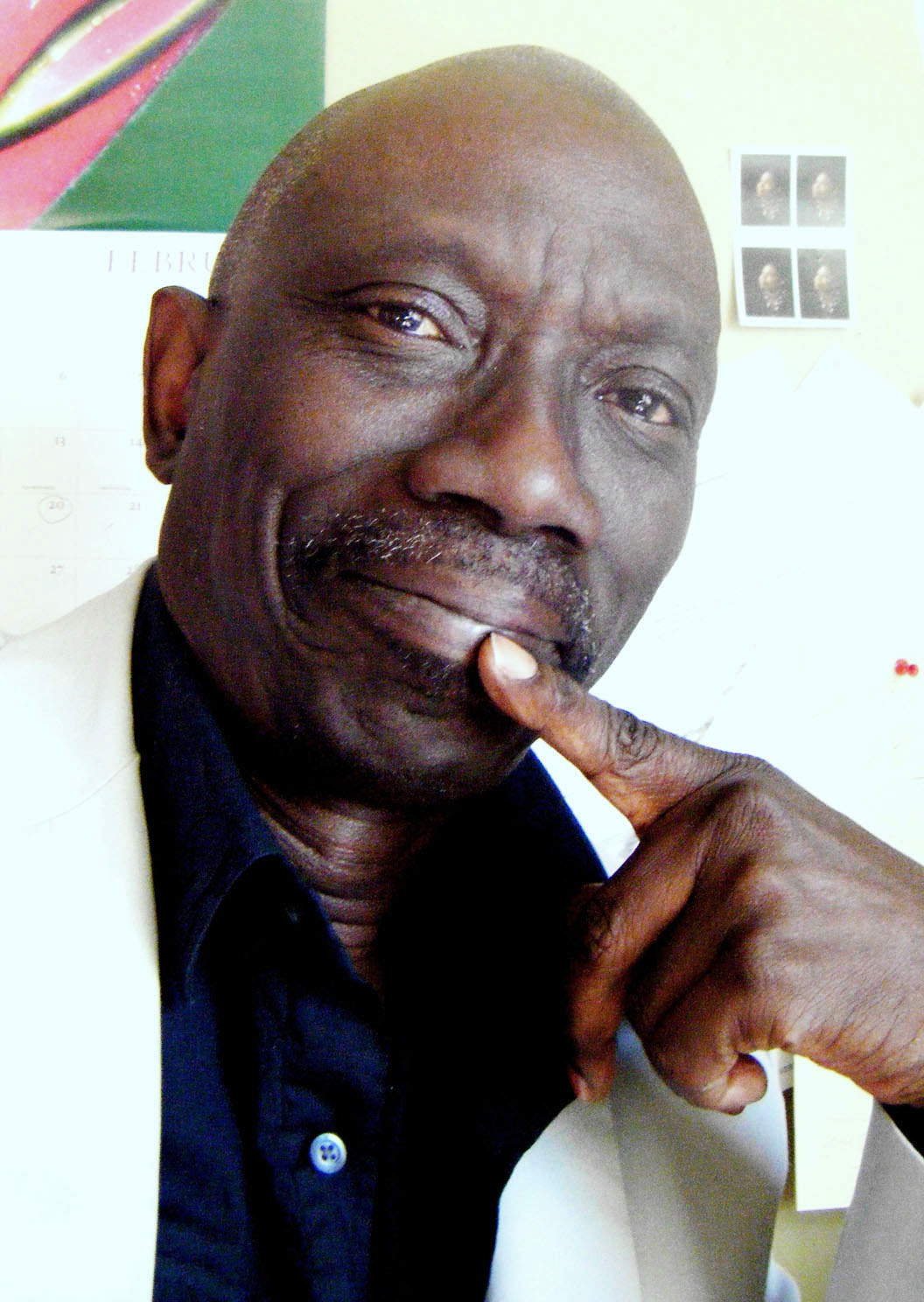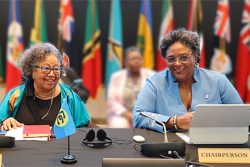 The Caribbean, including Guyana, has a population of close to 46 million. If one-quarter of those happen to be readers of literature produced by authentic Caribbean writers, we’re talking about 11,500,000 people. It, therefore, stands to reason that if a Caribbean novel is sold for one dollar, to each of that number of Caribbean readers, that Caribbean writer stands to make over $11 million for her/his creative undertaking. With takings like that, Caribbean writers would cease to be regarded as that destitute group worthy of pity for not having the sense to become doctors, lawyers, and politicians.
The Caribbean, including Guyana, has a population of close to 46 million. If one-quarter of those happen to be readers of literature produced by authentic Caribbean writers, we’re talking about 11,500,000 people. It, therefore, stands to reason that if a Caribbean novel is sold for one dollar, to each of that number of Caribbean readers, that Caribbean writer stands to make over $11 million for her/his creative undertaking. With takings like that, Caribbean writers would cease to be regarded as that destitute group worthy of pity for not having the sense to become doctors, lawyers, and politicians.
The posited analogy above, however, may only happen if inter-Caribbean reading is realised; and for such to happen, every Guyanese and every islander in the Caribbean must understand and accept that inter-regionalism is a current reality since, on casual examination, there is a shared Caribbean culture that all who are born in Guyana and the wider Caribbean can relate to. (Think of Paul Keens-Douglas. Why do you think Guyanese took his performances so readily to heart? Think of V S Naipaul’s Miguel Street, and ask yourself why, to the average Guyanese, every one of those characters inhabiting that fictional street are so well known?)
I am Guyanese and I grew up on books by Guyanese writers as well as writers from the Caribbean islands. I bought and treasured books by Earl Lovelace, Michael Anthony, V S Reid, Roger Mais, Orlando Paterson, Edgar Mittelholzer, Jan Carew, Grace Nichols, Samuel Selvon, Louise Bennett, and others. I reveled in the stories they told and the sociology amidst the culture these writers immersed their characters in, and I related because, as I posited, the Caribbean culture is in sync with the Guyanese culture. Bottom line, I identify as a Caribbean soul and an inter-Caribbean reader. As such, I buy and read Caribbean authors. Ask me what’s the last Caribbean novel I bought, and I’ll tell you, John Crow’s Devil by Jamaican, Marlon James. And before that? The Bone Readers by Grenadian, Jacob Ross, both interestingly, resident in the Diaspora. Sadly, however, the concept of a widespread inter-Caribbean readership is not realized. A Caribbean people, as a conscious collective of mind, does not yet exist, and I will use a pair of anecdotal experiences to make the point: When I lived in New Jersey and worked in a mailing room of immigrants from Guyana, the Caribbean, and Central America, I happened, one night, to stumble on a televised spelling bee competition in which a group of Jamaican children came out triumphant. I was proud! In my mind, “Caribbean power! Yes!” And so, filled with this Caribbean victory, I went to work the next morning and began talking about it, until a Jamaican coworker ruined the moment: “Goh deh, Harold!” he railed. “What you so happy about? Eh? Them is Jamaicans, not Guyanese!”
Then there was the time, after migrating from Guyana to the USA, I got about promoting a play I had written and was producing in Downtown Brooklyn. It was about the often-traumatic, new-immigrant-to-the-USA experience. The Guyanese mother of one of my cast members related an interaction she had with a Haitian coworker:
He says to her: “There’s a Guyanese play at the Paul Robeson Theater, you not going?”
She responds: “Yeah, my niece is in it. You checking it out?”
Her Haitian coworker replies: “No, it’s not a Haitian play.”
Caribbean nationalities as a divided group of people and not an intellectual collective have no power. And lack of power comes with the lack of self-respect and lack of respect from the ‘other’. If Caribbean nationals think as an intellectual cohesive, and inter-Caribbean reading is fostered, Caribbean writers will not die hand-to-mouth and destitute; in short, they won’t die continually broke.
As a Guyanese who had his first novel published by Heinemann Educational Books in 1986, I’ve been asked, “Why doesn’t Guyana set up a publishing company to publish Guyanese books?” As an answer, I explained that a publishing company is, first and foremost, a business; that anyone setting up a publishing house in Guyana to publish only Guyanese writers, would be a lunatic, since Guyana, with around 800,000 people (of which readers may only be a fraction), would never garner a profit, quickly putting that publishing house out of business.
But with the advent of inter-Caribbean reading being inculcated through rigorous private and intergovernmental campaigns, we stand a chance of harnessing millions of readers from a pool of the region’s 46 million residents. And therein lies the hope, promise, and viability of a true Caricom Publishing House, catering to Caribbean and Guyanese authors of all persuasions, and thus enabling each to make a solid living right in Guyana and the wider Caribbean.
Maybe, as Caribbean people, we should ask ourselves, which of our regional writers made it at home, with “made it” meaning, which of our writers were published in Guyana, Trinidad, Jamaica, Barbados (add your Caribbean country), made money, and were able to live as comfortably as a local doctor, lawyer, or politician? Here’s another question: How many of our writers are still in Guyana and the wider Caribbean? Let’s add another: How many of our writers in the Diaspora are as well off and comfortable as their American and British literary counterparts? How many Caribbean writers are making money from selling books in the Diaspora? How many dream of returning home to write and to make a living by pursuing their calling? How many have gone crazy? How many have already bitten the dust? All rhetorical. I have no answers. I just know that with the advent of widespread inter-Caribbean reading, Guyanese and Caribbean writers stand a chance to survive with relevance and respectability.
Writers from Guyana and the wider Caribbean become more relevant to their countries if they write at home, where their audiences are. It is a point that was made bluntly to me by an American editor from one of the huge, mainstream, Manhattan, NY publishing houses who consented to see me after I had migrated to the USA 25 years ago. There I was with a new copy of Apata: The Story of a Reluctant Criminal, published by Heinemann Educational Books of London. The woman looked at my book, read the blurb: “… Apata is an imaginative reconstruction of the life of the man at its center, a charismatic young Guianese whose hopes of a brilliant future are frustrated by the color of his skin. Despite his obvious abilities …”
She lifted her head … asked me what I was doing in the United States of America and went on to explain what I already knew, that what I wrote was tailored for Caribbean people, and that’s where my place as a writer was: with them. That my work did not suit an American demographic. It was a humiliating experience.
So, what can be done to foster inter-Caribbean readership? Maybe it can become a course at the University of the West Indies. Maybe it can be made into a compulsory CXC subject. Maybe public libraries can promote and host inter-Caribbean reading sessions and discussions to show how across-the-board many cultural Caribbean traits are. Maybe the cultural ministries of Caribbean governments can have writer exchange visits. The latter are just loose ideas that have popped into my head.
It will not happen in a short time, and this is because we have long been properly divided. And we added to it through a knack of dividing ourselves: island from island; island from mainland, and often by crass politics and sometimes race. A country’s writers are a country’s pride. The developed countries boast of their writers because their writers hold the aspirations of nations. Writers are the barometers of a country’s soul. They are the repositories of a country’s culture, its life-blood. As such, we need to find ways to make our writers feel relevant to Caribbean life and not a splinter group belonging to an irrelevant professional calling.
(Harold A Bascom, the 2015 winner of the Caribbean Award for Literature, and a four-time winner of the Guyana Prize for Literature. Bascom is a playwright, novelist, theatre director and visual artist. He currently lives and writes in the United States of America. haroldbascom@yahoo.com)










